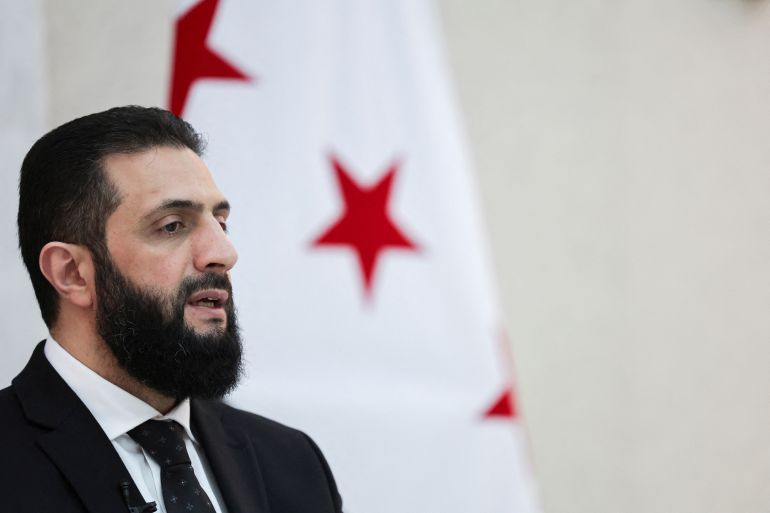Syrian President Ahmed al-Sharaa has said that protecting the country’s Druze citizens and their rights is a priority, as he announced that local leaders will take control of security in the city of Suwayda in a bid to end sectarian violence in the south and in the wake of deadly Israeli strikes in Damascus.
The Syrian leader made the statements in a televised speech on Thursday, addressing days of fierce clashes between Druze armed groups, Bedouin tribes and government forces in the predominantly Druze city of Suwayda that have killed more than 360 people, according to UK-based war monitor, the Syrian Observatory for Human Rights.
Israel, which sees the Druze as an ally, launched a series of powerful strikes near Syria’s presidential palace and on the military headquarters in the heart of Damascus on Wednesday, warning Syria it would escalate further if it did not withdraw from the south and halt attacks against the Druze community.
“We are keen on holding accountable those who transgressed and abused our Druze people, as they are under the protection and responsibility of the state,” Sharaa said in the speech, describing the minority as “a fundamental part of the fabric of this nation.”
“We affirm to you that the protection of your rights and freedoms is among our top priorities, and we reject any attempt aimed at pulling you toward an external party.”
Al-Sharaa said that “responsibility” for security in the violence plagued would be handed to religious elders and some local factions “based on the supreme national interest”.
Troops withdraw
The remarks came after the Syrian government and Druze leader Sheikh Yousef Jarbou announced a new ceasefire in the city, and said the army had begun withdrawing from Suwayda.
But there does not appear to be consensus in Suwayda among the Druze, a small but influential minority in both Syria and Israel.
While Sheikh Jarbou said he agreed to the ceasefire deal and spoke out against the Israeli strikes on Syria, telling Al Jazeera Arabic that “any attack on the Syrian state is an attack on the Druze community”, another influential Druze leader in the city said he rejected the ceasefire.
Sheikh Hikmat al-Hajari promised to continue fighting until Suwayda was “entirely liberated”.
‘Unknown fate’ avoided
In the speech, al-Sharaa called for national unity, saying that “the building of a new Syria requires all of us to stand united behind our state, to commit to its principles, and to place the interest of the nation above any personal or limited interest.”
Addressing the Druze community, he said the government rejected “any attempt to drag you into the hands of an external party”, in a reference to Israel’s intervention in the conflict.
“We are not among those who fear the war. We have spent our lives facing challenges and defending our people, but we have put the interests of the Syrians before chaos and destruction,” he said.
He added that Israel’s extensive strikes, including those that killed three people and injured 34 in Damascus on Wednesday, could have pushed “matters to a large-scale escalation, if it were not for the intervention of US, Turkish and Arab mediators “which saved the region from an unknown fate”.
The US, which has softened its stance towards Syria and is attempting to re-engage and support the country’s reconstruction after more than a decade of conflict, has been eager to de-escalate the conflict, which State Department spokesperson Tammy Bruce called “a misunderstanding between new neighbours”.
Actions ‘louder than words’
Speaking to Al Jazeera, Mohamad Elmasry, professor of media studies at the Doha Institute for Graduate Studies, said al-Sharaa’s speech contained encouraging messages about the place of the Druze minority in Syrian society.
“He said that the Druze are an essential component,” said Elmasry. “He said it’s the Syrian government’s responsibility to protect them and to hold to account those who have transgressed against them in recent days.”
But, he said, it would all come down to how his government behaved in the aftermath of the speech.
“II think their actions will speak louder than words for those minority groups in Syria.”
He said the speech also contained a note of warning to Israel that it did not fear war and that “anyone who starts a war with Syria … would regret it”.
“These were messages directed at Israel, and it marked a very significant departure from what we’ve heard from him and at times not heard from him when Israel has attacked Syria,” Elmasry said.
“I think we’re at a potentially dangerous tipping point and it really will come down to, I think, the extent to which Donald Trump and the United States are willing to kind of rein in Israel,” he said.
“It’s a very difficult situation in Syria. You are talking about a very multiethnic society. You have outside forces, starting with Israel, trying to basically fragment the country and establish a separatist system, if you will, in Syria,” Elmasry said.
Cycle of violence
The escalation in Syria began with tit-for-tat kidnappings and attacks between Druze armed factions and local Sunni Bedouin tribes in Suwayda province.
Government forces that intervened to restore order clashed with the Druze, with reports of Syrian troops committing abuses, according to local monitors and analysts.
Source: Aljazeera

Leave a Reply